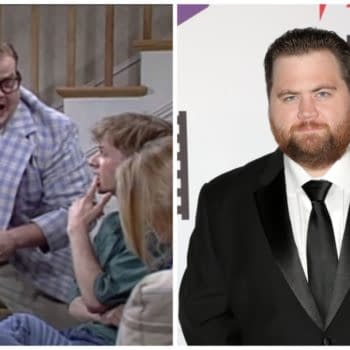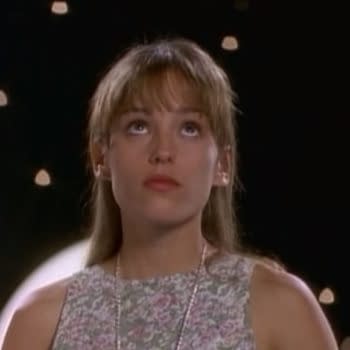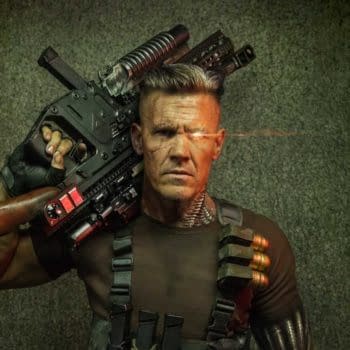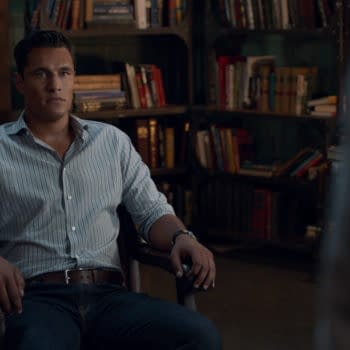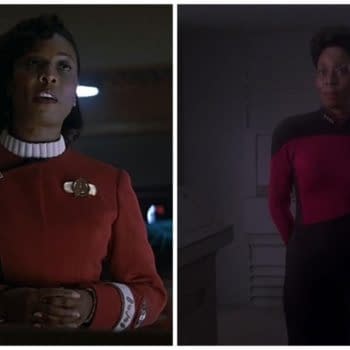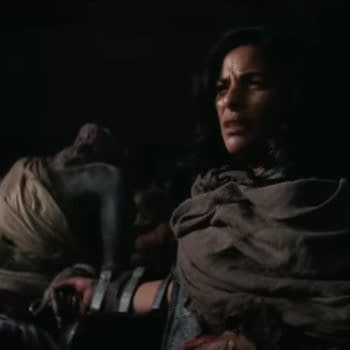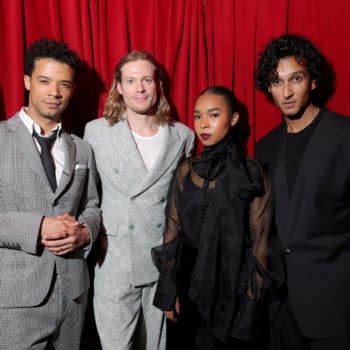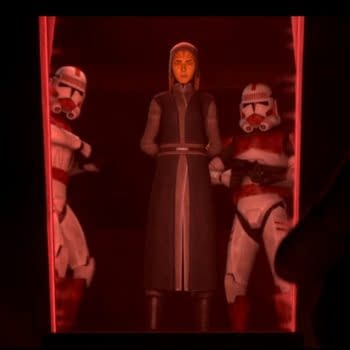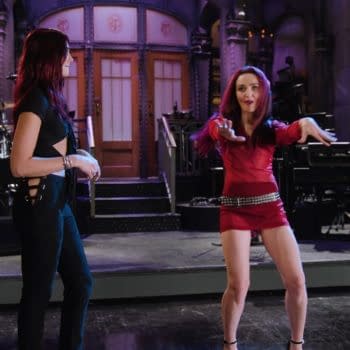Posted in: Audio Dramas, TV | Tagged: Audio Drama, Mindraker: Background Anger, podcast, Roy Burdine, Sean Schemmel, Spiral Opus Audio
Mindraker: Background Anger Creator & Star Talk Radio Dramas & More
Mindraker: Background Anger creator Roy Burdine and star Sean Schemmel spoke with Bleeding Cool about the sci-fi/mystery podcast & cohesion.
Mindraker: Background Anger creator Roy Burdine and star Sean Schemmel have had a long working creative relationship across various projects in the animation and voiceover world. Their latest is the eight-episode sci-fi podcast drama from Spiral Opus Audio that follows MARU (Schemmel), a conflicted man with a box of divinely gifted powers. He's a Mindraker, a designation given to psychic assassins by the forces defending mankind in a spiritual war. The two spoke with Bleeding Cool on a variety of subjects, including their relationship, how Schemmel compares recording voiceovers with audio dramas and audiobooks, and more.
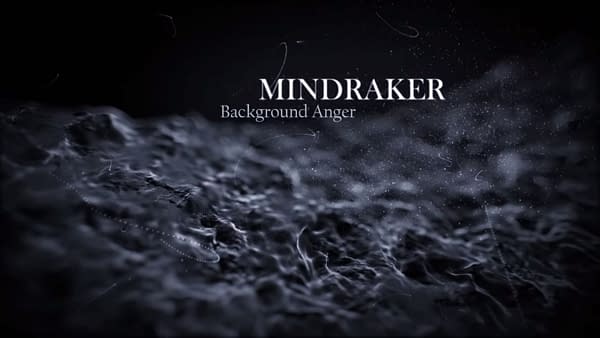
The Cerebral World of 'Mindraker'
Bleeding Cool: What's the inspiration behind 'Mindraker?'
Burdine: As an artist and working in animation, and even since I was a teenager, I've always been into sound because I'm drawing all day and night. I have to have something to listen to for hours on end. As soon as podcasting came out I was into it. I always wanted to do something in that area, but I didn't know what it would be. I don't want to go on and talk, I'm into telling stories. After years of thinking about it, various factors and inspirations led me to the specific approach I wanted to take with Mindraker. I showed the first few scripts to Sean and asked him if he'd want to do it. Lucky for me, he liked the idea and agreed to do it.
Schemmel: It's interesting from my perspective. I worked with Roy for years at 4Kids [Entertainment], he was a head animation director there and also directed a lot of the voiceover stuff later in the [Teenage Mutant] 'Ninja Turtles' series. He was also working on his own independent film, which I acted in. I always thought Roy was a solid writer, and it was good, but when he sent me this script, it was on another level. It didn't even seem like the same guy wrote it. I asked him who wrote it and he said, he did. I said, "It's so much different than your other stuff." And he said he'd been doing transcendental meditation for four years, and that's how this came to him. There's a psycho-spiritual element to the creation of this that was intriguing to me as Roy's friend and kind of watching him on his journey.
It's rare that I'm shocked by any of my colleagues who I've worked with for a long time, I know their work so well. I remember my friend Stephanie Sheh, who's fantastic on 'Monkie Kid,' her acting just went up so high, I remember asking her, "Are you doing acid or something? Did you look through the next dimension? Your acting's amazing." And she said, "No, I practiced and got better." In Roy's case, I was fascinated so much that during the pandemic, I took the transcendental meditation training class. I don't do it regularly, but I use it here and there, and it's helped me in some trying moments. Even though I've been a Buddhist since 1996, I find transcendental meditation works a little better for me than traditional mindfulness meditation from a Buddhist perspective.
I hope Roy is okay with me revealing that because I think it's one of the more intriguing things about the project. In meditation you're given a word to meditate on. Roy told me he would meditate on a word, and then ideas would come into his head, and he would meditate on them and get to a deeper level. I think that depth is evident in the narration. It was intriguing to me that this came to Roy out of a number of things that he could probably extrapolate on better than me.
Burdine: That's exactly what our hero does, right? He sits down and meditates, and it allows him to go into the minds of the people who have been invaded by these creatures. It all works together, and transcendental meditation was the thing that clicked it all into place for me. Everything you're saying is right, and it's in the actual story. What's funny is when we tried to do the movie in New York…what I wanted to do was an improv film where we set up the situations and let the actors create the scene, and it was a lot of fun. We never finished it, but the interesting thing is it felt like that came into play again when we did this. When we started, Sean was concerned that it was a lot to take in, a lot to study and prepare. But I suggested that his first interaction with the words should be the performance, because this is a stream of consciousness coming from the mind of our lead character, Maru. We want it to feel fresh. It's happening as we hear it, and so that's how he did it. I think it turned out fantastic.
Schemmel: Which I don't really have trouble with. I prepare when I'm doing a memorized movie role, but for most voice-overs like 'Dragon Ball,' or 'Monkie Kid,' I don't see scripts until I show up that day, so I was used to that idea. I figured, "Alright, let's feel the vibe and go, and then Roy will direct here and there to make sure it's right." I didn't have to retake too much because the words and the dialog put me in this kind of meditative state. It was almost like I was grabbing Roy's vibe from the writing and his meditation, and it created this narration voice, which we contrasted against the in-action dialog voice. It's one of the most intriguing projects I've worked on in 25 years of voice acting. I've been telling Roy we should shoot this, make this into a live-action film. It would be great.
With the podcast, it feels like one of these old-school radio dramas. How is performing in a project like this in the podcasting era compared to live-action or animation?
Schemmel: It's funny that you mention that because I've done a lot of audiobooks. I've even won several awards for doing them, but I haven't done that many. One of the reasons I don't is that they won't let me do them in the way that I want to. The ones that I won awards for, I recorded as a voice actor, like a radio drama. I did radically different voices for each character because I like all my audiobooks to be a radio drama. I don't listen to audiobooks because I don't want to listen to a voice actor who is probably good, but the performance is not what it could be because [the producers] won't let you fully commit to a voice. They'll tell you "Hint at it. We're going to hit it here and there. Change your voice a little bit for this guy and change it slightly for that guy." And I'm like, "No, I want it to be real!" I would love every audiobook to be a fully cast audio drama, and that's why I don't listen to audiobooks.
I liked that Roy was doing it with a full cast. I didn't grow up listening to radio dramas, but they were a thing. We studied them in acting school, and I had done them before because radio was still such a big thing when I was in high school and college.
I don't know what any of the other actors [in Mindraker] look like. I only have an idea what the main character, Maru, looks like based on the descriptions Roy gave me, but in this kind of audio drama your imagination becomes a powerful tool. It creates the images.
One difficult aspect of putting out this kind of audio drama as a podcast is that typically people think of a podcast as three or four people sitting around talking about some kind of factual subject, so when you tell people you're putting out a podcast their first reaction is "Are you talking about politics or murder?" Writing and performing scripts is not the first thing people think of.
Burdine: My big concern in approaching a podcast was figuring out how to tell a story that takes advantage of the unique properties of an audio presentation. I tell stories visually for a living in animation, so the task became how to do that using only sound. That's where the idea of the stream-of-consciousness narration came from. I wanted to hear something with a new way of painting the picture in the mind of the listener – the closest thing I can think of are song lyrics and music. The inner thought process is something audio can capture in a way that visual storytelling can't. For instance, if Mindraker became a movie, the story is very straightforward, so the first thing they would throw out would be the narration. That's native to the audio experience.
Schemmel: They had a narration on the original version of 'Blade Runner' because nobody could get it. They added that [laughs].
Burdine: Yeah, it's a very European thing. European audiences like narration in film, but they don't like it in America. I wanted to come up with a way to do it that wasn't "It's TV without pictures." I listen to a lot of dramatic podcasts, and there are some good ones out there, but there was always something I wanted to hear in them that I wasn't hearing. I kept thinking there's got to be a place between the straight radio drama and a music album – so that, like with music, you could listen repeatedly.
Schemmel: Your son did the synth music for us.
Burdine: Yeah, he did the theme when he was 15 years old.
Schemmel: It's quite good. There's also a musical break in the middle of each episode. I love that Roy did that because the narration can be a lot to digest. We're both prog rock fans, so to me, it's like a Rush track where you've got, after the end of a big movement, a synth riff comes in to give your brain a chance to process what happened. Also, if you pay attention, there are a lot of modern and classic song references in the narration, but they all make sense to the plot.
Burdine: The breaks are part of that idea of treating this as a purely audio expression. That's a perfect example. In the middle, I felt there should be a break, with music in the vein of what's happening in the story – a melodic representation of what you've been listening to. It also gives you that little bit of time to ease out the first part of the story, take it in, and then prepare yourself for the second half.
Mindraker: Background Anger, which also stars Vinnie Pena, Greg Abbey, Victoria May, Whitton Frank, Michal Roxie Johnson, Richard Kingston, John C. Martin, Zach Selwyn, Jerry Schwartz, Brie Piper, and Noel Rodrigo, releases on Thursdays.






